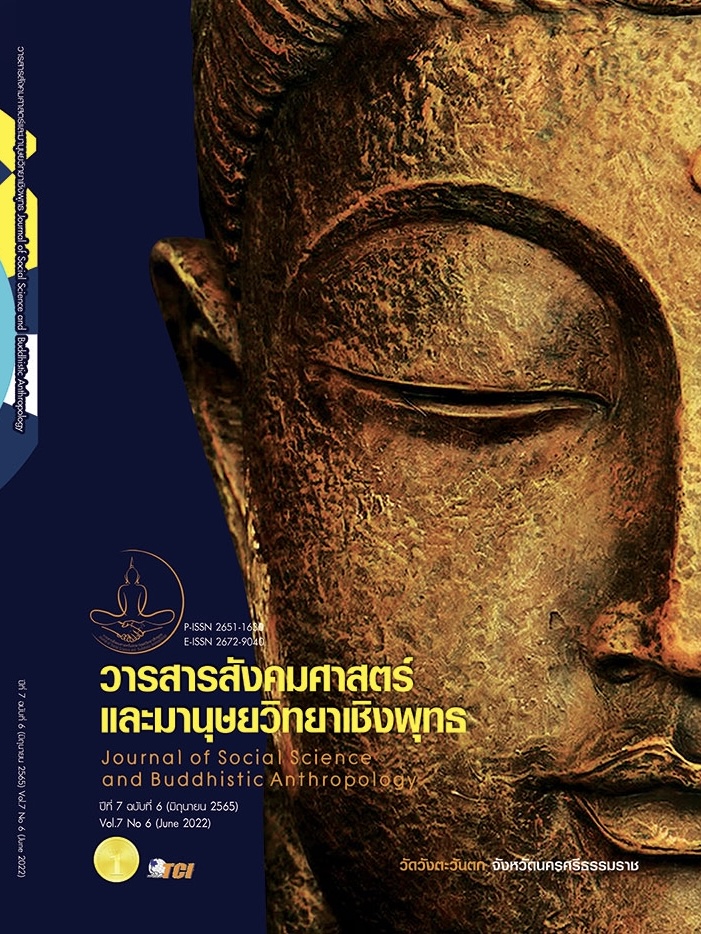DEVELOPING A CAUSAL MODEL FOR PERSONNEL MANAGEMENT IN THE MULTICULTURAL SOCIETY OF AREA 3 SOUTHERN BORDER PROVINCES TO CREATE THE COMPETITIVENESS OF THE ORGANIZATION IN THE DIGITAL ERA
Keywords:
Personnel Management, Plural Society, 3 Southern Border Provinces, the Digital Era OrganizationAbstract
The objectives of this research article were to 1) study the problem to the development of causal models, personnel management in multicultural societies 2) Study factors influencing the development of causal models, personnel management in multicultural societies, 3) propose the form to development of causal models, personnel management in multicultural societies of the three southern border provinces to create organizational competitiveness in the digital age by using mixed methods research consists of qualitative research which the sample included 1) 8 senior executives, 2) 4 senior government officials, and 3) 3 scholars involved in managing personnel in multicultural society, total are 15 people. And quantitative research, informants include 400 senior executives. It found that the model of developing causal models for personnel management in multicultural societies of the three southern border provinces to create the organization's competitiveness in the digital age consists of 1) Digital technology innovation with an influence of 0.439. It consists of 3 components: 1.1) product and service technology innovation, 1.2) process technology innovation, and 1.3) management technology innovation. 2) Strategic leadership, with an influence value of 0.398, consists of 3 elements: 2.1) leadership patterns and changes, 2.2) leadership patterns and transitions, and 2.3) creative leadership patter. 3) Organization modification with an influence of 0.288 consists of 3 elements: 3.1) policy, 3.2) organizational structure, and 3.3) resource. The development model of technology to promote the organization's capabilities in the digital era is consistent with empirical information, which supports the effectiveness of all organizational operations in the digital era to achieve its goals effectively.
References
กัลยา วานิชย์บัญชา. (2554). การวิเคราะห์สถิติขั้นสูงด้วย SPSS for Windows. กรุงเทพมหานคร: ธรรมสาร.
จุไรศิริ ชูรักษ์ และคณะ. (2560). การพัฒนาคุณภาพครูเพื่อพัฒนาการคิดวิเคราะห์ของนักเรียนในสังคมพหุวัฒนธรรม 5 จังหวัดชายแดนภาคใต้. สงขลา: มหาวิทยาลัยราชภัฏสงขลา.
ชมพูนุช ศรีพงษ์ และ คณะ. (2561). ความทุ่มเทในการปฏิบัติงานแก้ไขปัญหาและรักษาความมั่นคงในพื้นที่จังหวัดชายแดนใต้ของกำลังพลกองทัพภาคที่ 4 กองทัพบกไทย. วารสารมหาวิทยาลัยราชภัฏยะลา, 12(1), 1-16.
ฐนกร บุญจันทร์. (2560). รูปแบบภาวะผู้นำของหัวหน้าฝ่ายผลิตในอุตสาหกรรมยานยนต์. ใน ดุษฎีนิพนธ์บริหารธุรกิจดุษฎีบัณฑิต สาขาการพัฒนาองค์การและทรัพยากรมนุษย์. มหาวิทยาลัยเทคโนโลยีพระจอมเกล้าพระนครเหนือ.
ตรีเนตร ตันตระกูล. (2560). การพัฒนาทรัพยากรบุคคลในสำนักงานเขตประเวศ กรุงเทพมหานคร. วารสารวิชาการสถาบันเทคโนโลยีแห่งสุวรรณภูมิ (สาขามนุษยศาสตร์และสังคมศาสตร์), 3(2), 1-14.
เพ็ญภัทร์ อารี. (2563). การวางแผนการผลิตสำหรับชิ้นส่วนยานยนต์ที่มีความต้องการสินค้าไม่แน่นอน. ใน วิทยานิพนธ์มหาบัณฑิต สาขาวิชาวิศวกรรมอุตสาหการ. จุฬาลงกรณ์มหาวิทยาลัย.
ภัทคณิฐ ศรประสิทธิ์. (2559). แนวทางในการพัฒนาระบบผลิตแบบดึงสำหรับโรงงานผลิตชิ้นส่วนยานยนต์ขนาดกลางและขนาดเล็กในประเทศไทย. ใน วิทยานิพนธ์มหาบัณฑิต สาขาวิชาวิศวกรรมอุตสาหการ. จุฬาลงกรณ์มหาวิทยาลัย.
ศักดิ์ชัย ม่วงภาษี. (2559). การพัฒนาสมรรถนะวิศวกรรมย้อนรอยสำหรับบุคลากรในภาคอุตสาหกรรม : กรณีศึกษาอุตสาหกรรมยานยนต์และชิ้นส่วน. ใน ดุษฎีนิพนธ์ปรัชญาดุษฎีบัณฑิต สาขาเทคโนโลยีเทคนิคศึกษา. มหาวิทยาลัยเทคโนโลยีพระจอมเกล้าพระนครเหนือ.
สำนักงานสภาความมั่นคงแห่งชาติ, สำนักนายกรัฐมนตรี. (2560). นโยบายการบริหารและการพัฒนาจังหวัดชายแดนภาคใต้ พ.ศ. 2560 - 2562. กรุงเทพมหานคร: สำนักงานสภาความมั่นคงแห่งชาติ.
สุวกร อุดรเดช. (2560). คุณภาพชีวิตการทำงานในสังคมพหุวัฒนธรรมจังหวัดชายแดนใต้ของครูสังกัดสำนักงานเขตพื้นที่การศึกษาประถมศึกษาสตูล. ใน วิทยานิพนธ์ศึกษาศาสตรมหาบัณฑิต สาขาวิชาบริหารการศึกษา. มหาวิทยาลัยหาดใหญ่.
อัสณีย์ มะนอ. (2560). ปัจจัยที่มีผลต่อพฤติกรรมการสร้างเสริมสุขภาพของตำรวจที่ปฏิบัติงาน ในพื้นที่ 3 จังหวัดชายแดนใต้. ใน วิทยานิพนธ์ศึกษาศาสตรมหาบัณฑิต สาขาหลักสูตรและการสอน. มหาวิทยาลัยสงขลานครินทร์ วิทยาเขตปัตตานี.
C.H. Chan, S. & Mak, W. M. (2014). Transformational leadership, pride in being a follower of the leader and organizational commitment. Leadership & Organization Development Journal, 35(8), 674-690.
Certo, S. C. & Certo, S. T. (2015). Modern Management: Concepts and Skills. U.S: Pearson Education.
Durkan, J. (2017). The global integration of business functions: A study of multinational business in integrated global industries. Journal of International Business Studies, 34(4), 327-344.
Hilberg, J. S. & Meiselwitz, G. (2008). Undergraduate fluency with information and communication technology: perceptions and reality. In Ekstrom, J. J. & Stockman, M. (Ed.) SIGITE '08: Proceedings of the 9th ACM SIGITE conference on Information technology education. NY, United States: the Association for Computing Machinery (p. 5-10).
Joo, B.-K. (Brian) et al. (2012). The effects of core self‐evaluations and transformational leadership on organizational commitment. Leadership & Organization Development Journal, 33(6), 564-582.
Kasim, N. A. A. & Minai, B. (2009). Linking CRM Strategy, Customer Performance Measures and Performance in the Hotel Industry. Journal of Economics and Management, 3(2), 297-316.
Maly, T. (2015). How Digital Filmmakers Produced a Gorgeous Sci-Fi Movie on a Kickstarter BudgetWired. New Jersey: Prentice Hall.
Mason, C. et al. (2014). Transformational leadership development: Connecting psychological and behavioral change. Leadership & Organization Development Journal, 35(3), 174-194.
Mesu, J. et al. (2015). Transformational leadership and organisational commitment in manufacturing and service small to medium-sized enterprises: The moderating effects of directive and participative leadership. Personnel Review, 44(6), 970-990.
Tedre, M. (2006). The Development of Computer Science: A Sociocultural Perspective. In Berglund, A. (Ed). Baltic Sea '06: Proceedings of the 6th Baltic Sea conference on Computing education research: Koli Calling 2006. NY, United States: the Association for Computing Machinery (p.21-24).
Wheelen, T. L. & Hunger, D. L. (2008). Strategic Management and Business Policy. (11th Ed.). U.S: Pearson Education.
Downloads
Published
How to Cite
Issue
Section
License
Copyright (c) 2022 Journal of Social Science and Buddhistic Anthropology

This work is licensed under a Creative Commons Attribution-NonCommercial-NoDerivatives 4.0 International License.









